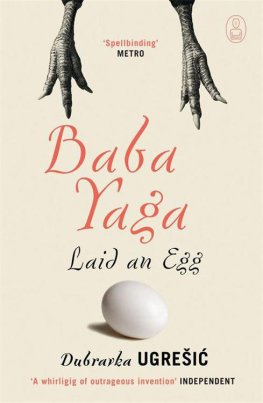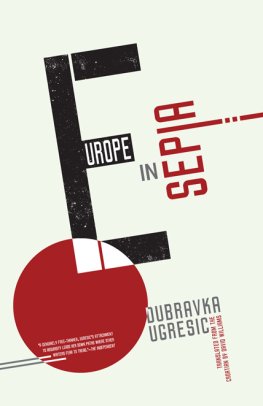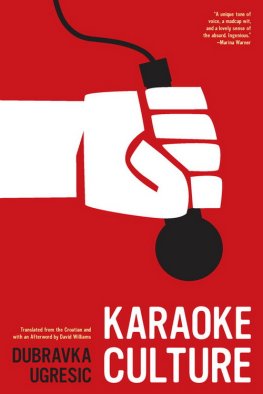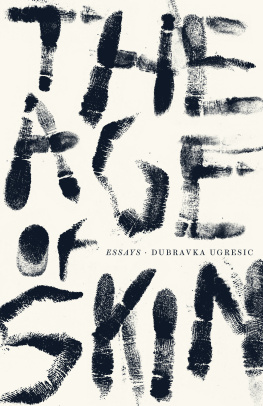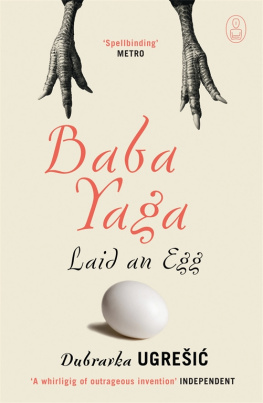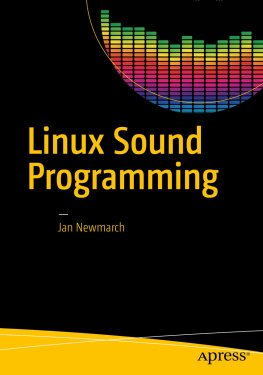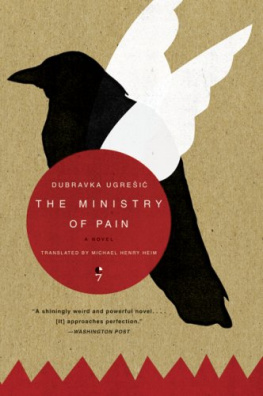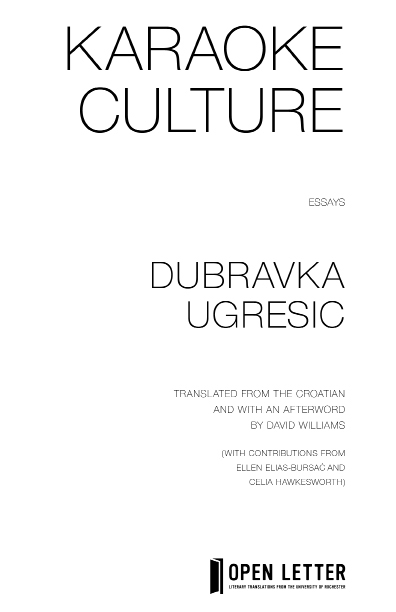Copyright
All changes and revisions to the original edition of this book (published in Belgrade and Zagreb as Napad na minibar , 2010), including the title, essay selection, inclusion of new essays, chapter headings, and amendments to individual essays originate with the author.
Copyright 2011 by Dubravka Ugre i
Translation copyright 2011 David Williams
Cans of Tuna Fish and the European Classics, Captain, Sir, We Have Plenty of Coffee!, The Hairdresser with the Poodle, Dangerous Liaisons, and The Spirit of the Kakanian Province translation copyright 2011 Ellen Elias-Bursa
Old Men and Their Grandchildren translation copyright 2011 Celia Hawkesworth
First edition, 2011
All rights reserved
Library of Congress Cataloging-in-Publication Data: Available.
ISBN-13: 978-1-934824-59-7
ISBN-10: 1-934824-59-3
Design by N. J. Furl
Open Letter is the University of Rochesters nonprofit, literary translation press:
Lattimore Hall 411, Box 270082, Rochester, NY 14627
www.openletterbooks.org
1.
Karaoke
Culture
And by the mid-afternoon he was again overcome with the desire to be somewhere else, someone else, someone else somewhere else.
Jonathan Safran Foer,
Everything Is Illuminated
Help me. I had a dream last night. I was skipping through a meadow holding a picnic basket and the basket was marked Options. And then I saw there was a hole in the basket.
Mr. Kugelmass, the worst thing you could do is act out. You must simply express your feelings here, and together well analyze them. You have been in treatment long enough to know there is no overnight cure. After all, Im an analyst, not a magician.
Then perhaps what I need is a magician, Kugelmass said, rising from his chair.
Woody Allen,
The Kugelmass Episode
... But one day
The sun will stand where the heart once stood
And there will be no words in human speech
That a poem would renounce
Everyone will write poetry ...
Branko Miljkovi, Everyone Will Write Poetry
We human beings hog the limelight on this new stage of democratized media. We are simultaneously its amateur writers, its amateur producers, its amateur technicians, and, yes, its amateur audience. Amateur hour has arrived, and the audience is now running the show.
Andrew Keen,
The Cult of the Amateur:
How Todays Internet Is Killing our Culture
1.
Why Karaoke,
and Whats Culture
Got To Do with It?
It needs to be said upfront: Im not a karaoke fan. This essay was not only conceived, but also half-finished, when it occurred to me to go and catch a bit of real karaoke. They say Casablanca is the most popular karaoke bar in Amsterdam. My companion and I, both neophytes, arrived at eight on the dot, as if we were going to the theatre and not a bar. Casablanca was empty. We took a walk down Zeedijk, a narrow street packed with bars whose barmen look like they spend all day at the gym and all night in the bar. Muscles and baggy eyelidsthat pretty well describes our barman at Casablanca , to which we soon returned. On a little stage, two tall, slender young women were squawking a Dutch pop song into a couple of upright microphones. A concert featuring Dutch pop stars played on the bars TV screens but was drowned out by the evenings young karaoke stars. The girls sang with more heart than the guys, and for a second I thought there must be an invisible policeman standing over them. The whole thing was a deaf collective caterwaul: deaf insofar as nobody actually listened to anyone. Amsterdam is definitely not the place for a karaoke initiation. Im not sure why I even thought of going to see karaoke in Amsterdammaybe because of the paradox that sometimes turns out to be true, that worlds open up where we least expect.
I was watching the film Lost in Translation for the third time and had stopped at the part where Bill Murray, with fatalistic forbearance, does his karaoke number. I sat down at the computer and opened YouTube. Trailing a few words behind and holding out little hope that Id ever catch up, I gave singing I Will Survive a go. It was an invigorating experience. I had a go at opera too. I managed to warble along with a popular aria from The Phantom of the Opera , but on Andrea Bocellis Con Te Partir I could only get my tongue around the first line of the chorus. That song definitely has too many unpronounceable words.
I thought about buying the karaoke version of Ti Voglio Tanto Bene for $2.99, but gave it a pass. I didnt buy Cantolopera either, which would have let me sing operatic arias accompanied by a whole orchestra. I didnt even buy a teach-yourself pack, a virtual coach for classical singers . But when I saw an Internet ad for a karaoke program that promised to recreate the joys, sorrows, ecstasy and anguish of opera while I was having my morning showerI very nearly caved. Its not that I like warbling in the shower; its just that Im a sucker for emotionally charged ads with rich vocabularies. And I almost forgot, I also listened to a few karaoke singers on a site called Singers Showcase. My favorite was the sad Mr. Sandy and his bear-like growl through Georgia On My Mind.
What is karaoke in actual fact? Karaoke (Japanese for empty orchestra) is entertainment for people who would like to be Madonna or Sinatra. The karaoke machine was invented in the early seventies by the Japanese musician Daisuke Inouewho forgot to patent his invention, and so others cashed in. A few years ago Inoue apparently won the alternative Nobel Peace Prize (the Ig Nobel), awarded by The Annals of Improbable Research . They praised him for providing an entirely new way for people to learn to tolerate each other.
Cultural critics are people who are prepared to see more in the craze for tattoos than just a passing fashion fad. Im a member of this dubious guild. In karaoke Im ready to see more than just desperate squawking to the backing track of I Will Survive. Karaoke supports less the democratic idea that everyone can have a shot if they want one and more the democratic practice that everyone wants a shot if theres one on offer. The inventor of karaoke, Daisuke Inoue, is a humble man, most proud of having helped the Japanese, emotionally reticent as they are said to be, change for the better. As Pico Iyer wrote: As much as Mao Zedong or Mohandas Gandhi changed Asian days, Inoue transformed its nights.


